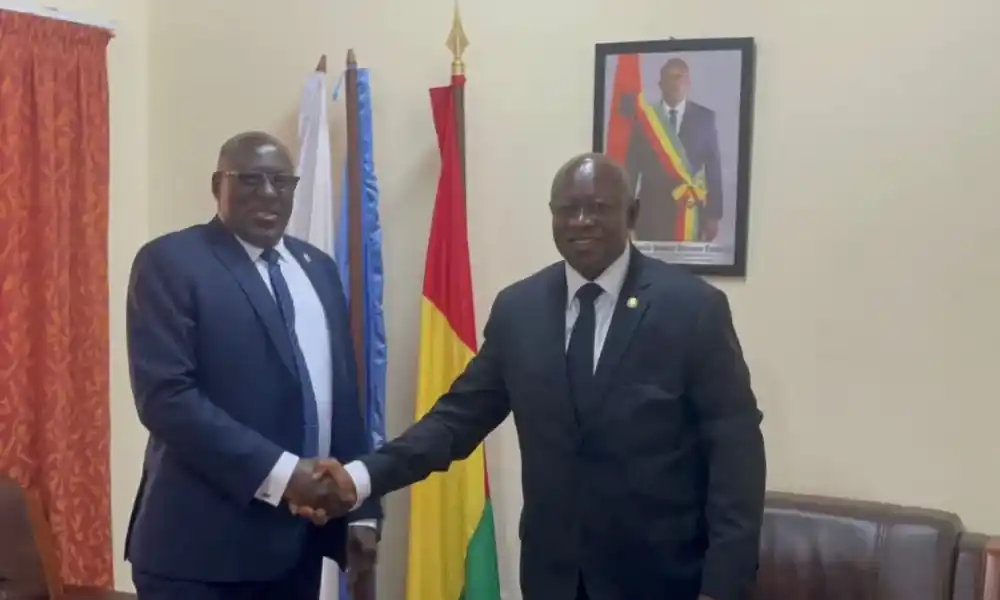The Speaker of the ECOWAS parliament, Dr Sidie Mohamed Tunis, has said that the lack of Single Currency in the sub-region has hampered feasible expor
The Speaker of the ECOWAS parliament, Dr Sidie Mohamed Tunis, has said that the lack of Single Currency in the sub-region has hampered feasible exports which currently stands at 10 percent margin and it is very low for a region with a population of 400 million people.
Dr Tunis disclosure this at the opening of the fifth Legislature held in Bissau, Guinea Bissau, with the theme “ECOWAS Common Currency and the Inter Bank Payment System as Promoters of Regional Trade”.
He said, “As you are aware, intra-regional trade is relatively low in the ECOWAS region. According to statistics, it represents about 10% of both exports and imports of Member States.
“Several reasons have been put forward to explain these low levels of intra-community trade. Among these, the lack of a single currency among ECOWAS Member countries has been identified as a major obstacle and a factor that aggravates transaction costs. In addition, efficient payment systems are a stimulus for intra-regional trade.
“Having identified these challenges, and to increase the volume of trade in the region, the ECOWAS Authority of Heads of State and Government decided to accelerate the process of creating a single currency, through the adoption of the convergence pact and a new roadmap for the launch of the single currency by 2027. It is gratifying to state that this decision by the “of State, has led to significant progress in recent years”.
According to the Speaker, the seminar was organized for members to be informed on the policies and programmes of the Community, which includes the state of progress of the single currency programme, and the project for the development of the inter-bank payment system.
“The Parliament also wishes to contribute fully to the process of creating the single currency, by ensuring effective monitoring of the Community bodies and institutions in charge of this programme and by promoting the support of the populations of which we are, in essence, the closest representatives.
“This parliamentary seminar should, therefore, enlighten us on the conditions for strengthening convergence and macroeconomic stability in the region.
“It would also provide a greater insight into the coordination of economic policies, and the development of a payments system for the Member States to facilitate their economic integration. Furthermore, this seminar would address all the other challenges we are determined to meet, to achieve the single currency by 2027, as announced”.
The programme will also provide opportunity for Members of Parliament to debate the new roadmap submitted by the ECOWAS Commission to the Authority of Heads of State and Government and make proposals and recommendations guaranteeing the start of the monetary union in 2027.
“In conducting this seminar, we intend to take advantage of the expertise of Resource Persons from the ECOWAS Commission, the West African Monetary Agency (WAMA) and the West African Monetary Institution (WAMI), as well as other experts from the region who have worked painstakingly to produce high quality reports and studies on the single currency process.
“I would like to take this opportunity to thank the ECOWAS Commission for the remarkable work it has done so far. Specifically, I wish to commend the President of the ECOWAS Commission and his Commissioners, as well as other Heads of Institutions and Agencies of the Community, for their dedication and selflessness in the implementation of the monetary cooperation programme.
“It is important to bear in mind that achieving a common currency would, no doubt, be a major milestone in the West African cooperation and integration programme. We have a duty to make that happen.
“Let me state that the advent of a single currency gives us the opportunity to build a strong economy that can compete with other emerging economies in the world. It is, therefore, our duty to seize this historic opportunity. I wish us a very good seminar, hoping that whatever output we achieve here in the next three days, would go a long way in benefitting the people of the region”, he added.
In his keynote address, President of the Republic of Guinea Bissau, Umaro Sissoco Embalo, threw his weight behind the parliament in actualising the adoption of the Single Currency within the ECOWAS region.
He said: “We are creating a new economy which is also financial and commercial within ECOWAS, the money system that we want to establish will encourage or stimulate our development and maintain the friendship, solidarity and cooperation among our countries and populations.
“The process should be conducted very conclusively especially as there are various challenges ahead, this is the reason to introduce the common Currency also the involvement of political class and all those interested parties as well as creating a foundation of strong political and economic integration”.
Naijablitznews.com reports that the seminar will be followed by the first extraordinary session of the ECOWAS Parliament in 2023, from 30 January to 3 February 2023, also in Bissau.
ECOWAS Parliament is composed of 115 seats. For the allocation of these seats, each member state is guaranteed a minimum of five seats. The remaining forty seats are distributed in proportion to the population of each Member state. Based on this distribution format, Nigeria has 35 seats, Ghana 8, Côte d’Ivoire 7, Burkina Faso, Guinea, Mali, Niger and Senegal have 6 seats each. Others, namely, Benin, Cape Verde, Gambia, Guinea Bissau, Liberia, Sierra Leone and Togo have 5 seats of representation each.


COMMENTS